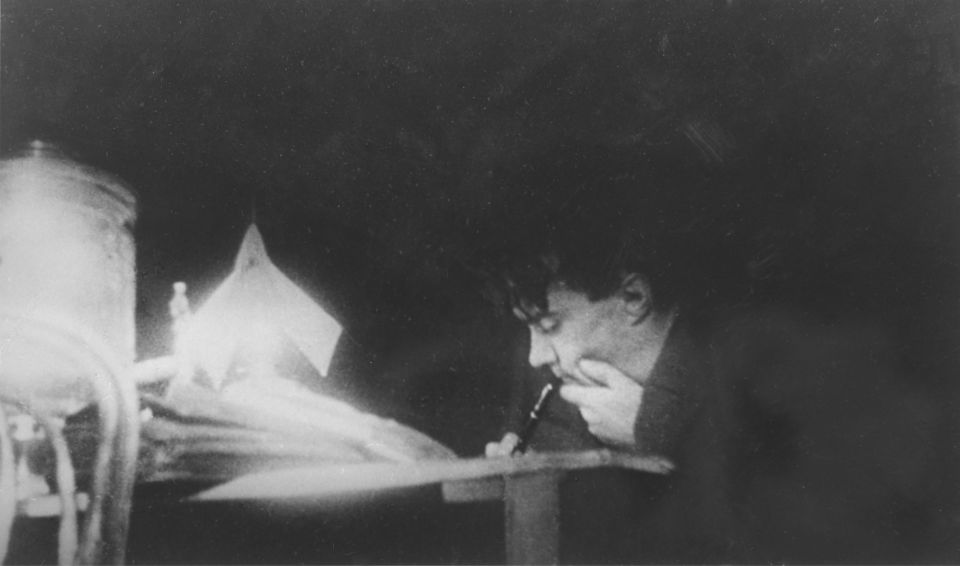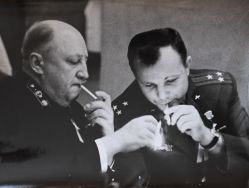The USSR’s main newspaper, “Pravda”, published regular reports from Nuremberg from the first day of the Tribunal: “tassovki” – dry, though detailed daily summary reports by TASS. But the main events of the trials were reported by the most prominent writers and journalists - like Pravda’s special Nuremberg correspondent, Boris Polevoi.
Göring occupied the rostrum from 13 to 22 March – longer than any of the defendants. He began with many hours of speeches (the court allowed him to do so), then defence counsel Otto Stahmer examined his client and his witnesses, then Göring himself fought off questions from the prosecutors and members of the Tribunal.
Boris Polevoi witnessed the Göring marathon from the first to the last day, and was flabbergasted. We can safely state this because the writer did not want to hide his feelings: Polevoi was clearly stunned by Göring’s “shameless lies”.
“Hunters have an apt saying – ‘the beast doubles back’. It means that the beast of prey, when overtaken by its pursuers, begins to make incredible turns and loops in the snow in an attempt to confuse its pursuers and put them on a false trail. Hermann Göring is trying to do the same thing right now. From the first word of his testimony he began ‘winding’, shamelessly lying, twisting the facts, piling one absurdity on top of another, doing such incredible pirouettes in his statements that they are simply obscene to hear.
(...)
Göring has a recipe: to lie as much and as brazenly as possible, blame those absent Hitler, Himmler, Goebbels, deny everything, no matter how solid and irrefutable the evidence.
‘Von Neurath?’ Göring declares, ‘President of the Privy Cabinet Council of the Third Reich? What are you talking about? He is not a war criminal. He is a purely decorative figure; he knew nothing about the affairs of the Third Reich and took no part in them. The Privy Council was invented by Hitler himself to allow this nice-looking gentleman an opportunity to be seen as one of the most important high officials in the Reich without encumbering himself with any business. It is my contention that the Privy Council itself did not actually exist and never even met.
Field Marshal Wilhelm Keitel? Göring uses the same method. ‘Keitel’, Göring blatantly lies, ‘had no weight in deciding any military matters. He was something of a telephone, relaying Hitler's orders to the army. He is a delicate man; he played Wagner on the piano to Hitler in the evenings as they travelled through the occupied countries. And nothing else’.
Infuriated by this lie, Lord Justice Lawrence interrupts the defence and declares that the Court is totally uninterested in hearing from Göring the gossip that has circulated in the General Staff.
(...)
It comes down to Rosenberg. It seems difficult to say anything mitigating in favour of Hitler's chief obscurantist, who wrapped the atrocities of fascism up in the vague guise of delusions about the special qualities of German blood, about a German ‘master race’. But, as it turned out, this obscurantist and Hitler's chief executioner in the occupied regions and republics of the Soviet Union, who spilled the blood of the peaceful Soviet people all over the occupied territory from the Baltic States to the Black Sea, was, according to Göring, just a peaceful weirdo, a kind of out-of-this-world philosopher who forgets his shoes in the hallway.
(...)
Unbelievable but true. The late Goebbels would have burst with envy if he had listened to these masterpieces of brazen lies.
(...)
It turns out the Nazis were saving Germany from the ‘hands of the Reds’. By attacking peaceful countries – Czechoslovakia, Yugoslavia, Greece – the Nazis were allegedly securing their right flank against... an attack by the Soviet Union. Contrary to all that was said and proved at the trials, confirmed even by defence witnesses Milch and Kesselring, Göring portrays the attack on the Soviet Union as a ‘preventive war’, prepared almost a year in advance.
(...)
Dr Stahmer summoned Dahlerus to prove the most ridiculous thesis about Göring's supposed peacefulness. This is what he encouraged the witness to do with his questions. But now the chief of the British prosecution, Sir Maxwell-Fyfe, gets to cross-examine him. Questioned by the prosecutor, Dahlerus was forced to admit that it has now become clear to him that in all the behind-the-scenes negotiations taking place he was essentially playing the pathetic role of disguising fascism's frantic preparations for war. (...) This defence witness, called by Stahmer to whitewash the fascist clique, leaves the rostrum stating that Hitler, according to his observations, was a mad scoundrel, Göring – a disgusting sycophant under Hitler, and Ribbentrop – a murderer.More to read
The Soviet representative, Comrade Rudenko, went on to examine Göring. A decisive blow struck against Göring and the entire ‘cunning’ system of his defence (...).”
If we take the transcripts of the Tribunal sessions from those days, we find that much of what Polevoi described did not actually take place. Göring did not portray Keitel as a nonentity, Dahlerus did not call Hitler a scoundrel and Göring a sycophant and so on. Technically speaking, Boris Polevoi did not write a report about what happened at the Nuremberg trials. Polevoi wrote a report about what was going on in his soul.
Göring did lie, and that was proven by the prosecutors who conducted the examination. It was meticulously proven by presenting the defendant one document after another, stating in set terms the opposite of what Göring was trying to convince the audience of. An indifferent spectator could even find this procedure boring. But not a Soviet correspondent, a frontline veteran, patriot and victor, convinced that he was right. Göring, who barely shut his mouth for a week, fired the flames of hatred in Polevoi's soul. This flame inspired images and lines, fictitious yet true.
Boris Polevoi's report is not a Nuremberg trial document. It is a document of the era of the Nuremberg trials.
By Yulia Ignatieva

























